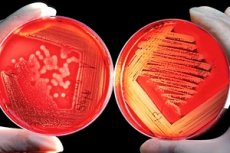New publications
The severity of coronavirus infection may depend on the quality of the gut flora
Last reviewed: 02.07.2025

All iLive content is medically reviewed or fact checked to ensure as much factual accuracy as possible.
We have strict sourcing guidelines and only link to reputable media sites, academic research institutions and, whenever possible, medically peer reviewed studies. Note that the numbers in parentheses ([1], [2], etc.) are clickable links to these studies.
If you feel that any of our content is inaccurate, out-of-date, or otherwise questionable, please select it and press Ctrl + Enter.

It is known that the course of COVID is always different for different people: in some, the disease can proceed almost asymptomatically, while in others, pneumonia develops, the temperature rises, and other serious symptoms appear. The scientific world is still trying to figure out what factors can cause the development of a severe form of the disease. It has already been established that a certain risk is present in people with a lack of vitamin D in the body. To date, experts have discovered another factor: the composition of the intestinal microbiome.
The scientists published the results of their study in the journal Gut. During the experiment, fecal samples were taken from patients with coronavirus infection - both from asymptomatic patients and from people who were in critical condition. In addition, feces of convalescents and healthy volunteers who had not had COVID-19 were analyzed. It was found that the composition of the intestinal microbiome in sick and healthy people was very different.
The intestinal tract of infected patients was deficient in the bacterial microorganisms Bifidobacterium adolescentis, Fecalibacterium prausnitzii, Eubacterium rectale, which should play an important role in immune function. At the same time, they had an excessive number of other microorganisms, which should normally be less. The more severe the disease, the more obvious the bacterial imbalance. Interestingly, the abnormal microbial ratio was detected even a month after the patients had recovered.
Scientists have suggested that people with abnormal intestinal bacterial balance are more vulnerable to the virus. The lack of bacteria important for immune defense provokes problems with resistance to the disease. As a result, unpleasant consequences develop that bother a person even after his recovery.
Of course, it is possible that the coronavirus pathogen itself destroyed the vast majority of beneficial microflora in the intestines. To prove otherwise, many experts insist on conducting a repeat study, during which it would be possible to compare the test results before coronavirus infection and after convalescence. If the bacterial imbalance is noticed only from the moment the disease develops, then it will be possible to conclude that intestinal bacteria have no effect on the severity of COVID-19.
For now, scientists can only recommend maintaining the quality of intestinal microflora as a preventative measure against coronavirus infection. Most likely, in the near future, researchers will continue their work and please us with more accurate and optimistic results.
The impact of microbiome quality on immune function and the development of certain diseases has already been confirmed in a number of scientific studies. As for the incidence of COVID-19, at this stage, scientists are already conducting additional evidence-based experiments.
